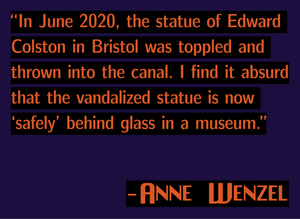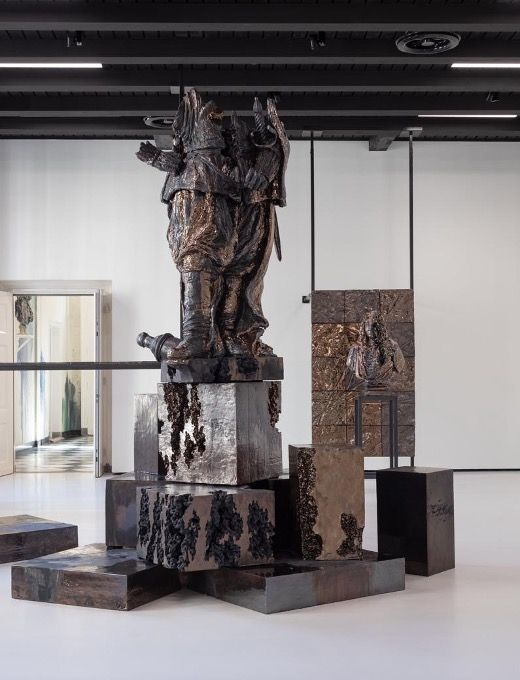Interview Anne Wenzel

- Anna Odink
Until January 14, artist Anne Wenzel showcased her interpretation of controversial monuments in public space with the exhibition Carte Blanche (Fuck The Dictator) at the Stedelijk Museum Schiedam. "My installations focus on statues in public space that have been defaced, moved, or removed. Based on that, I've created a whole series. I find it important that we critically review our history, and I believe that the Netherlands should do this even more," Wenzel explains. According to Wenzel, views on statues are inconsistent: "Visions constantly change, and that's why we shouldn't only see things in public space that confirm our beliefs and ideas."
The Royal Netherlands Academy of Arts and Sciences (KNAW) advises in the report Unstable Pedestals. Controversial monuments in public spaces to supplement controversial monuments, for example, with a critical framing, a counter-monument, or artistic transformation.
What do you think of the adaptation of controversial monuments in public space?
"Controversial statues need to be provided with a different context, but in a way that allows that context to change. In June 2020, the statue of Edward Colston in Bristol was toppled and thrown into the canal. I find it absurd that the vandalized statue is now 'safe' behind glass in the museum. I believe our perception of history is constantly changing, and in this way, the statue is preserved from the protest. In the museum, the statue is now also at a distance from the public. Whereas the public, through the act of protest, had actually appropriated the statue."
Unlike relocating controversial statues to the museum, Wenzel envisions contextualizing statues within the museum. In Carte Blanche (Fuck The Dictator), Wenzel took existing statues as a starting point and subsequently created an entirely new sculpture. "It's as if some statues are burnt down. J.P. Coen has been reduced to the bottom of his body, and the entire pedestal he stands on is shaky. I deliberately placed Johan Maurits very high, showing his position of power. It's a recontextualization of the statues, but in a white cube. I don't have a solution for controversial statues in public spaces. However, I believe our history needs to be revisited, and that goes beyond just the statues. Our perception doesn't only change when the statue is removed."
Wenzel prefers not to see only old, white men represented in monuments. "I think many new monuments should also be created. There must be come an alternative vision in public spaces. That's why the placement of the statue Moments Contained by Thomas J. Price, of the woman at Rotterdam Central, is so important."
Anne Wenzel - House of Fools (Jan), 2023
Courtesy AKINCI Amsterdam, Galerie Suzanne Tarasieve, Parijs. Photos: Peter Tijhuis
A bridge between Art and Politics
In the museum, a space was allocated to uncovering the process preceding the exhibition. The entire development of the project was visually represented through a timeline on the walls. "I wanted to address the role of (sculptural) art in society and the role of the museum." According to Wenzel, Carte Blanche (Fuck The Dictator) had to become an open, art-driven process that comments on the ownership, usage, and distribution of power in the Dutch art world.
Wenzel underscores the importance of representing artists: "Art committees are crucial throughout the process of creating art in public spaces. You often get good art when they have courage or power. Organizations like Stroom in The Hague and CBK in Rotterdam represent such positions of artists. Municipalities deal with so many committees. I think there is often insufficient knowledge about art in public spaces within the municipality. It is very important to have art committees; they can act as a link between the municipality and the artist."
[1] Referenced from the exhibition text booklet ‘Anne Wenzel: Carte Blanche (Fuck the Dictator),' room 3.
About Anne Wenzel
Anne Wenzel makes sculptures and installations, mainly using ceramics. Themes such as heroism, and decay inspire Wenzel. Until January 14, 2024, Anne Wenzel showcased her version of controversial monuments in public space with Carte Blanche (Fuck the Dictatorship) at the Stedelijk Museum Schiedam. On November 10, 2023, her Razzia monument in Rotterdam was unveiled. The memorial stands for all victims of the raid on November 10 and 11, 1944, in Rotterdam and Schiedam. The monument consists of two sculptures and is located on the Parkkade by the water.
Until March 2, 2024, a part of the works exhibited in Carte Blanche (Fuck the Dictatorship) will be on display in House of Fools at Akinci Galerie, Amsterdam.

